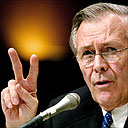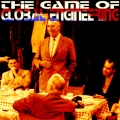| 2000:
director of a company which wins $200m
contract to sell nuclear reactors to North
Korea
2002: declares
North Korea a terrorist state, part of the
axis of evil and a target for regime change
Randeep Ramesh Friday May 9, 2003 - The
Guardian
 WWW,
2003 (Archived) - Donald Rumsfeld,
the US defence secretary, sat on the board
of a company which three years ago sold two
light water nuclear reactors to North Korea
- a country he now regards as part of the
"axis of evil" and which has been
targeted for regime change by Washington
because of its efforts to build nuclear
weapons. Mr Rumsfeld was a non-executive
director of ABB, a European engineering
giant based in Zurich, when it won a $200m (£125m)
contract to provide the design and key
components for the reactors. The current
defence secretary sat on the board from 1990
to 2001, earning $190,000 a year. He left to
join the Bush administration. WWW,
2003 (Archived) - Donald Rumsfeld,
the US defence secretary, sat on the board
of a company which three years ago sold two
light water nuclear reactors to North Korea
- a country he now regards as part of the
"axis of evil" and which has been
targeted for regime change by Washington
because of its efforts to build nuclear
weapons. Mr Rumsfeld was a non-executive
director of ABB, a European engineering
giant based in Zurich, when it won a $200m (£125m)
contract to provide the design and key
components for the reactors. The current
defence secretary sat on the board from 1990
to 2001, earning $190,000 a year. He left to
join the Bush administration.
The reactor deal was part of President
Bill Clinton's policy of persuading the
North Korean regime to positively engage
with the west.
The sale of the nuclear technology was a
high-profile contract. ABB's then chief
executive, Goran Lindahl, visited North
Korea in November 1999 to announce ABB's
"wide-ranging, long-term cooperation
agreement" with the communist
government.
The company also opened an office in the
country's capital, Pyongyang, and the deal
was signed a year later in 2000. Despite
this, Mr Rumsfeld's office said that the de
fence secretary did not "recall it
being brought before the board at any
time".
In a statement to the American magazine
Newsweek, his spokeswoman Victoria Clarke
said that there "was no vote on
this". A spokesman for ABB told the
Guardian yesterday that "board members
were informed about the project which would
deliver systems and equipment for light
water reactors".
Just months after Mr Rumsfeld took
office, President George Bush ended the
policy of engagement and negotiation pursued
by Mr Clinton, saying he did not trust North
Korea, and pulled the plug on diplomacy.
Pyongyang warned that it would respond by
building nuclear missiles. A review of
American policy was announced and the
bilateral confidence building steps, key to
Mr Clinton's policy of detente, halted.
By January 2002, the Bush administration
had placed North Korea in the "axis of
evil" alongside Iraq and Iran. If there
was any doubt about how the White House felt
about North Korea this was dispelled by Mr
Bush, who told the Washington Post last
year: "I loathe [North Korea's leader]
Kim Jong-il."
The success of campaigns in Afghanistan
and Iraq have enhanced the status of Mr
Rumsfeld in Washington. Two years after
leaving ABB, Mr Rumsfeld now considers North
Korea a "terrorist regime _ teetering
on the verge of collapse" and which is
on the verge of becoming a proliferator of
nuclear weapons. During a bout of diplomatic
activity over Christmas he warned that the
US could fight two wars at once - a
reference to the forthcoming conflict with
Iraq. After Baghdad fell, Mr Rumsfeld said
Pyongyang should draw the "appropriate
lesson".
Critics of the administration's bellicose
language on North Korea say that the problem
was not that Mr Rumsfeld supported the
Clinton-inspired diplomacy and the ABB deal
but that he did not "speak up against
it". "One could draw the
conclusion that economic and personal
interests took precedent over
non-proliferation," said Steve
LaMontagne, an analyst with the Centre for
Arms Control and Non-Proliferation in
Washington.
Many members of the Bush administration
are on record as opposing Mr Clinton's
plans, saying that weapons-grade nuclear
material could be extracted from the type of
light water reactors that ABB sold. Mr
Rumsfeld's deputy, Paul Wolfowitz, and the
state department's number two diplomat,
Richard Armitage, both opposed the deal as
did the Republican presidential candidate,
Bob Dole, whose campaign Mr Rumsfeld ran and
where he also acted as defence adviser.
One unnamed ABB board director told
Fortune magazine that Mr Rumsfeld was
involved in lobbying his hawkish friends on
behalf of ABB.
The Clinton package sought to defuse
tensions on the Ko rean peninsula by
offering supplies of oil and new light water
nuclear reactors in return for access by
inspectors to Pyongyang's atomic facilities
and a dismantling of its heavy water
reactors which produce weapons grade
plutonium. Light water reactors are known as
"proliferation-resistant" but, in
the words of one expert, they are not
"proliferation-proof".
The type of reactors involved in the ABB
deal produce plutonium which needs refining
before it can be weaponised. One US
congressman and critic of the North Korean
regime described the reactors as
"nuclear bomb factories".
North Korea expelled the inspectors last
year and withdrew from the nuclear
non-proliferation treaty in January at about
the same time that the Bush administration
authorised $3.5m to keep ABB's reactor
project going.
North Korea is thought to have offered to
scrap its nuclear facilities and missile pro
gramme and to allow international nuclear
inspectors into the country. But Pyongyang
demanded that security guarantees and aid
from the US must come first.
Mr Bush now insists that he will only
negotiate a new deal with Pyongyang after
the nuclear programme is scrapped.
Washington believes that offering
inducements would reward Pyongyang's
"blackmail" and encourage other
"rogue" states to develop weapons
of mass destruction.
|

































 WWW,
2003 (Archived) - Donald Rumsfeld,
the US defence secretary, sat on the board
of a company which three years ago sold two
light water nuclear reactors to North Korea
- a country he now regards as part of the
"axis of evil" and which has been
targeted for regime change by Washington
because of its efforts to build nuclear
weapons. Mr Rumsfeld was a non-executive
director of ABB, a European engineering
giant based in Zurich, when it won a $200m (£125m)
contract to provide the design and key
components for the reactors. The current
defence secretary sat on the board from 1990
to 2001, earning $190,000 a year. He left to
join the Bush administration.
WWW,
2003 (Archived) - Donald Rumsfeld,
the US defence secretary, sat on the board
of a company which three years ago sold two
light water nuclear reactors to North Korea
- a country he now regards as part of the
"axis of evil" and which has been
targeted for regime change by Washington
because of its efforts to build nuclear
weapons. Mr Rumsfeld was a non-executive
director of ABB, a European engineering
giant based in Zurich, when it won a $200m (£125m)
contract to provide the design and key
components for the reactors. The current
defence secretary sat on the board from 1990
to 2001, earning $190,000 a year. He left to
join the Bush administration.